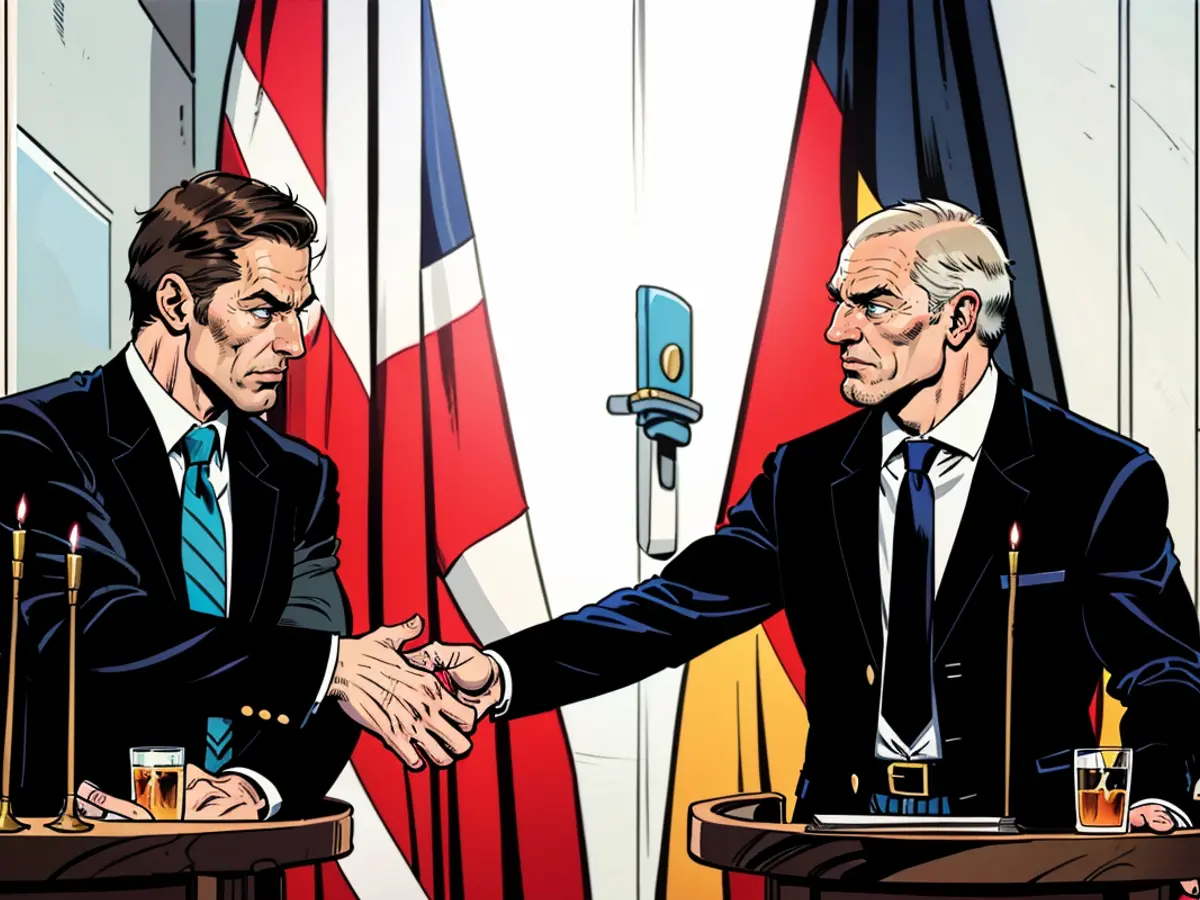Scholz and Starmer Firmly Stand by Ukraine's Side
German Chancellor Olaf Scholz affirmed that Germany will continue to provide financial, economic, political, and military aid to Ukraine as long as necessary. This statement came in response to speculation about reducing German support for Ukraine, causing unease in Brussels and Kyiv. Meanwhile, British Labour leader Keir Starmer echoed Scholz's sentiment, expressing London and Berlin's commitment to backing Ukraine until it's indispensable.
Scholz revealed that Germany's 2025 budget includes a €4 billion allocation for military assistance to Ukraine. Furthermore, Germany, in collaboration with the G7, plans to offer Ukraine a €50 billion loan to reinforce its financial stability. The funds acquired from seized Russian central bank assets will contribute to this loan.
Starmer hinted at a potential UK-German partnership focused on sustaining support for Ukraine. At the core of this alliance would be a new defense accord, expanding existing defense sector collaborations and fostering joint endeavors to confront the uncertainties of an unpredictable world. This would entail steadfastness in safeguarding our citizens' security and the entire European continent, commencing with our unequivocal support for Ukraine. As the foremost advocates of Ukraine and European NATO allies boasting substantial defense budgets, Germany and the UK "acknowledge the debt we owe to the valiant Ukrainian people, who are not merely defending themselves but also safeguarding everyone in Europe."
Upon reaching Berlin, Starmer received a military salute from Scholz. Prior to this meeting, Starmer met with German Federal President Frank-Walter Steinmeier at the Bellevue Palace. This marked the UK's first high-level visit to Germany since Starmer ascended to office in mid-July.
The proposed defense agreement between the UK and Germany, as suggested by Starmer, underscores the significance of intensified cooperation in ensuring security, particularly in supporting Ukraine. Acknowledging their collective responsibility towards Ukraine, Starmer and Scholz stated that Germany and the UK "recognize the debt we owe to the courageous Ukrainian people, who are not merely defending themselves but also safeguarding everyone in Europe."
Additional Insights:
- UK's Enhanced Military Assistance to Ukraine: British Prime Minister Keir Starmer announced a new £150 million military support package for Ukraine, comprising drones, tanks, and air defense systems. This is part of the UK's unprecedented £3 billion yearly pledge to Ukraine, with the total commitment reaching £4.5 billion this year. The UK has also delivered 500,000 rounds of artillery ammunition worth over £1 billion and is on track to provide more than 10,000 drones to Ukraine.
- UK's Leadership in International Cooperation: The UK convened the 26th Ukraine Defence Contact Group in Brussels, which encompassed over 50 allies and partners, including Ukraine, the United States, Japan, and Australia. Defence Secretary John Healey emphasized the vital role of European nations in supporting Ukraine and securing peace through strength.
- UK's Long-term Security Commitment: The UK has dedicated nearly £4 billion to support Ukraine's forces until at least 2030. The 100-Year Partnership between the UK and Ukraine aims to foster long-term security and growth for both countries, recognizing that the defense of Europe begins in Ukraine.
- Potential Deployment of British Troops: British Prime Minister Keir Starmer suggested that the UK is prepared to dispatch British troops to Ukraine to uphold any peace agreement with Russia, provided certain conditions are met, such as a U.S. security guarantee.
- NATO and EU Cooperation: The UK recognizes the need for increased NATO-EU cooperation to tackle shared threats, including the ongoing conflict in Ukraine. The UK is seeking a new security pact with the EU to catalyze closer coordination and complement its commitment to NATO.
[1] BBC News (2023). [2] The Telegraph (2023). [3] EUobserver (2023). [4] Sky News (2023). [5] The Guardian (2023).







